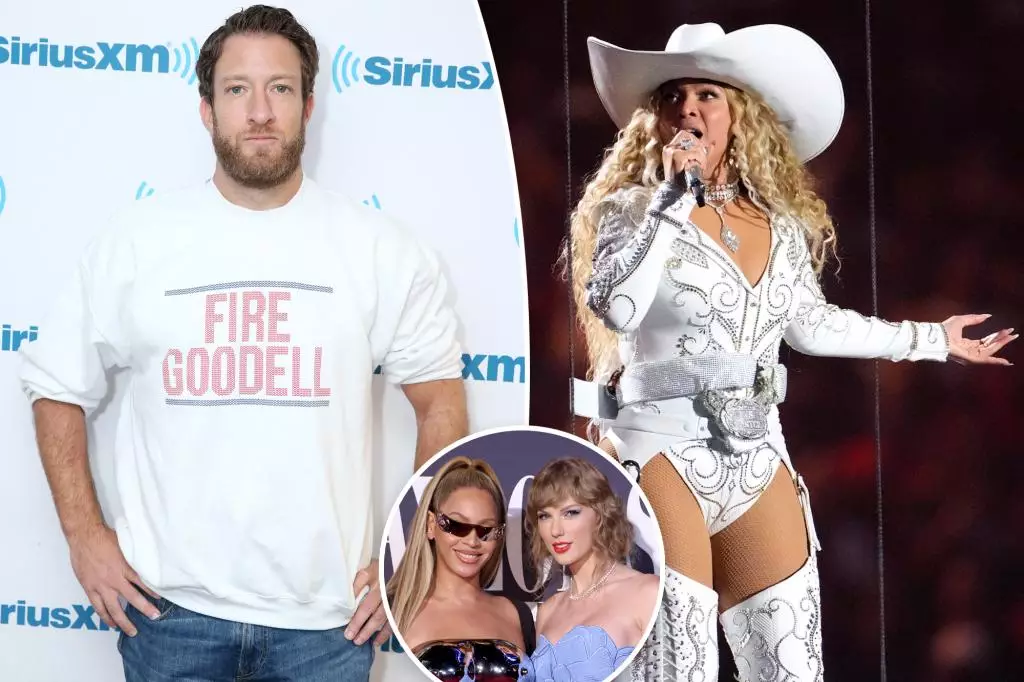In the realm of modern pop music, few rivalries evoke as much intrigue and passion as that between Taylor Swift and Beyoncé. Their respective fan bases are as dedicated as they come, with visceral reactions that can dominate social media discussions and headlines alike. A recent commentary from Dave Portnoy, founder of Barstool Sports, illustrates just how polarizing these figures can be. His public disdain for Beyoncé’s performance at the Baltimore Ravens vs. Houston Texans Christmas Day halftime show has sparked a renewed examination of the rivalry, highlighting the intricacies of musical legacy, public perception, and the nature of artistic evolution.
Portnoy’s critique of Beyoncé—asserting that she has been “lost” since her Destiny’s Child days—illustrates a viewpoint that often emerges when pop stars evolve past their early personas. Riding in on horseback and dazzling the audience with an elaborate costume, Beyoncé’s performance at the NRG Stadium in Houston was nothing short of a spectacle. She sang popular tracks from her recent country album, *Cowboy Carter*, and showcased impressive collaborations, yet Portnoy’s disapproval echoes a larger conversation about the acceptability of change within the music industry.
One must consider why Portnoy’s comments sting. His sentiment could reflect a societal tendency to cling to an artist’s original image rather than embrace their artistic growth. Many critiques of artists like Beyoncé stem from nostalgia for an earlier era. However, this brings forth an essential question: should artists be confined to the identities that originally made them famous?
Beyoncé’s foray into a variety of musical styles, including country, demonstrates the boldness associated with true artistry. Yet, fans and critics such as Portnoy sometimes seem to take these risks as threats. By juxtaposing Beyoncé’s shift with Taylor Swift’s continuous reinventions—from country darling to pop sensation—one can observe how public taste and fandom can influence opinions on artist longevity and relevance.
Taylor Swift, who also recently faced critique for her own artistic transitions, remains a powerhouse in her right. Interestingly, her fans often regard Beyoncé as a peer, if not a rival. Portnoy’s unabashed preference for Swift over Beyoncé triggers discussions about favoritism among pop icons and how fandom influences perception. Posturing within this narrative reveals deeper societal dynamics, not just about music, but about female artists navigating their careers amid often-harsh scrutiny.
Gender Dynamics in Pop Culture
This ongoing debate surrounding Beyoncé and Swift is ripe with implications about gender and societal expectations. Both artists have achieved incredible success and broken numerous records, yet they are frequently subject to the whims of public opinion, often in ways their male counterparts are not. Challenging this dynamic is crucial; fans and critics alike should focus on each artist’s merit while recognizing the unique paths they traverse.
The dynamics analyzed in this situation are not new. Earlier instances—such as Kanye West’s infamous interruption of Swift’s acceptance speech at the 2009 MTV VMA—illuminate long-standing tensions in the relationship between female artists in a competitive landscape dominated by patriarchal narratives. The scrutiny applied to both these icons, therefore, must be questioned and contextualized within a broader conversation about respect for women’s autonomy in their narratives.
Dave Portnoy’s remarks are merely a microcosm of the broader cultural conversation surrounding pop music. His robust criticism of Beyoncé leads to a deeper narrative inquiry—one that questions societal expectations of female artists, navigates the seas of change in music, and ultimately confronts what it means to be revered in an age fixated on legacy. Whether one prefers Swift or Beyoncé may boil down to personal taste, but the resulting dialogue sheds light on critical issues facing all entertainers: adaptation, acceptance, and the relentless pursuit of artistic integrity.
The friction between these two dominant forces in the music industry serves as more than just fodder for public commentary. It invites an examination of how we, as a culture, understand and accept change. While Dave Portnoy’s critique is just one voice in a cacophony of opinions, it elevates the discourse surrounding how we champion or cast aside our idols for their evolution. And as we navigate this music-filled world, perhaps it is time for audiences to appreciate the artistry behind every note, rhythm, and reinvention.

